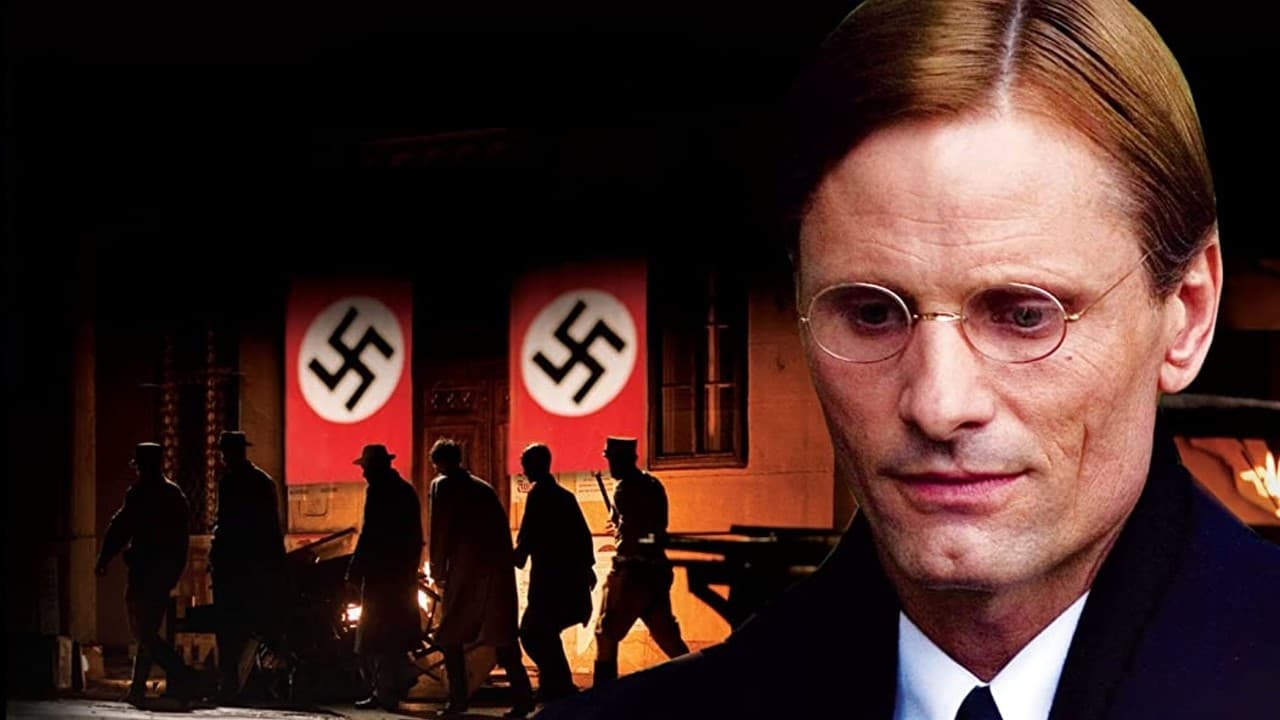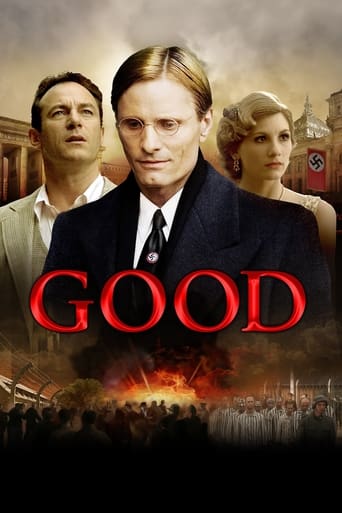

The story of a 'good' man in 1933 Germany who is slowly seduced into the glory/practicality/inevitability of National Socialism should have been powerful. It would still make a very powerful mini-series and right now would be the time that is ripe for it. The primary fault is that, with the exception of Mortensen, the entire cast is British (not that there's anything wrong with that) and while they avoided having actors speak with phony German accents, the Very British-ness of the thing, set in Berlin, just nagged throughout. I think one time someone says something in German. The secondary fault is that the script is taken from a stage-play and not adapted with 'powerful film' in mind. The passion behind the project is apparent but this is one time when the original source could have used some 'punching up' fine tuning. The tertiary fault (I had to look that up) is that Mortensen works too hard to create a character too timorous for 'us' to apply our empathy. Not so much 'bad' as disappointing.
... View More"Good" starts quietly, but ends powerfully. It goes to the heart of our sense of right and wrong.The movie is set in Germany a few years before WW2. John Halder (Viggo Mortenson) is a WW1 veteran and university lecturer who lives in a small apartment with his wife, two children and a demanding, invalid mother.He has written a novel about euthanasia, which the new Nazi government finds is in accord with their ideas, and John is offered a post within the SS. Although he is anything but a Nazi, John nonetheless enjoys the advantages the position offers him although it compromises his relationship with his friend, Maurice Glückstein (Jason Isaacs), a Jew.John also leaves his wife and marries a sexy young student, Anne (Jodie Whittaker); he is a man who seems easily seduced in love and in life. Eventually, in the film's grim finale, John is forced to confront his lack of firmness and the realities of the Nazi regime.The story shows in microcosm how the Nazis seduced the Germans, and how they accepted the loss of personal freedoms and worse for what seemed to be for the good of the nation, a better life, and maybe, just not to rock the boat. However, there was a price to pay and once ensnared there was no turning back.The film probably has more relevance to people who know some history of the times, because it helps explain why John acts the way he does - although not stated overtly, his actions are driven by underlying fear. There are little touches that the filmmakers don't feel necessary to explain such as why the previous occupants of Anne and John's new apartment have left so suddenly - a knowledge of the times would suggest that they were Jews who had been evicted.Some scenes are painful to watch, especially as John fails to help Maurice as the Nazis ramp up their persecution of the Jews. Here, the film seems to challenge the viewer, "What would you do in his place"? Would you have the courage to swim against the tide of events? John is basically a decent man, however he is too pliable, too apathetic, and does not act until it is too late."Good" may seem slow to some, "Iron Man 2" it is not. But I feel that the time it takes to build its characters pays off in the end - we become involved. One of the most asked questions in history is how did the Nazis manage to sway ordinary Germans to their cause? This film gives part of the answer in an intimate and accessible way. As British philosopher Edmund Burke famously said, " The only thing necessary for the triumph of evil is for good men to do nothing".
... View MoreWhat have I done? What have I done? You can imagine that Professor John Halder (Viggo Mortensen) was asking that question over and over.He seemed not to understand what was happening to him as he let himself be used by the Nazi's. First, he joins the party, then he loses his lifelong friend simply because he was Jewish. It was only when he was picked to inspect the death camps did he come to a full realization of the depths into which he had sunk.How do you cook a lobster? If you throw it into a pot of boiling water it will scream and jump out. But, if you put it in water and slowly raise the temperature, it boils before it knows what/s happening. Professor Halder was put in tepid water and the temperature raised gradually until the shock hit him full force, and he could not escape.Mortensen was very good, but his friend Morris (Jason Isaacs), a Jew, was excellent.
... View More...as onomatopoeic as it could have been, "Good" boasts a motivated, talented cast (Viggo "The Road" Mortensen, Jason "Harry Potter..." Isaacs, Gemma "ditto..." Jones, and Mark "Kick-Ass" Strong, among others), some nice lensing by Andrew "Precious" Dunn, and all-round quality production values, but in the end, the script by an industry tyro fails to live up to or expand upon the source material: Brit playwright C. P. Taylor's brilliant 1981 stage play. In a nutshell, "Good" limns the tragic descent into the "banality of evil" of a pre-WWII German literature professor who is drawn into the cruel orbit of Nazism (and specifically the SS) and ultimately betrays everyone near and dear to him, all the while rationalizing that he is only a "good" man doing the "right" thing. Taylor's script is brilliant, engaging, horrifying and emotionally stunning. This film version is not. It does its best to capture the heart of the play, but fails to illuminate its soul.Partly the failure is due to the traditional cinematic approach, and the inevitable distance it creates with its audience. In the play, the main character, John Halder (Mortensen), continually breaks the fourth wall, speaking directly to his audience, a tactic that film is only rarely able to justify dramatically, and even more rarely pull off with any success (take a moment; try to think of how many movies you've seen where that sort of thing works. Can't think of too many, can you?) Nonetheless, it's somewhat of a change of pace from more conventional movies about the Holocaust, in that it focuses on the human nature of the instigators rather than the victims, and as far as that goes is worth a watch, but if you ever get the chance, go see a production of the play (should you be so lucky to have the opportunity); it's miles ahead of this well-intentioned but unsatisfying film (I've given it a five instead of the six I would have otherwise awarded it for that specific reason). You'll be glad you did.
... View More